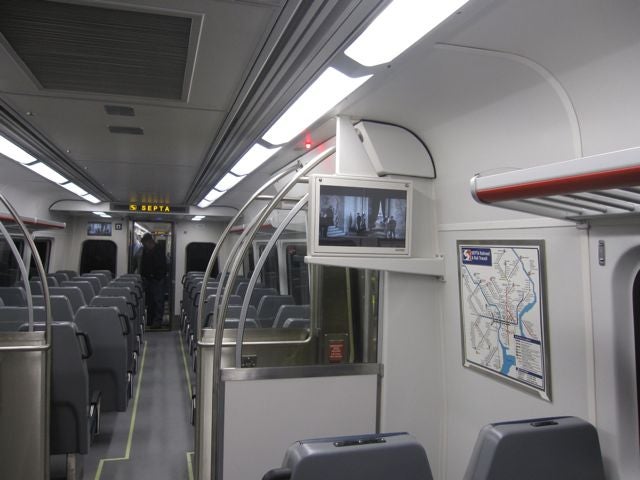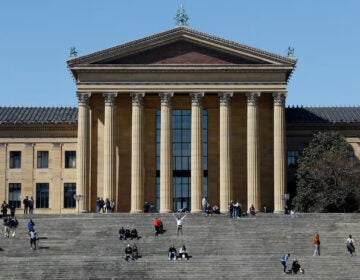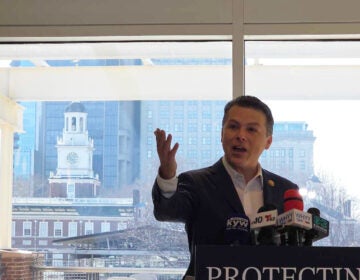Manayunk residents fight for Rector St. bus stop back
Sometimes even the best intentions have controversial consequences.
Manayunk residents in the vicinity of Main and Rector streets were surprised to discover that a long-standing bus stop had recently been removed. They expressed concern that the process lacked any input from the community.
The bus stop in question is located at the entrance of the Manayunk Tavern. The Tavern has an outdoor café license allowing it to have tables and chairs on the sidewalk around its establishment. According to SEPTA spokesperson, Andrew Bush, the change of bus stop was made by the Manayunk Development Corporation.
“[SEPTA] looked at the route and found stops a block away on either side,” said Bush. “While I do not have the complete numbers, ridership was found to be low at this bus stop.”
One of the most surprised about the bus stop removal was Jane Lipton, MDC executive director.
The city ordinance dealing with sidewalk café seating states that seating is prohibited within 15 feet of a transit stop.
According to Lipton, the MDC was trying to find a solution over the bus stop between a resident and the Tavern. Lipton sent Howard Moseley, the MDC director of governmental relations and infrastructure, to investigate the resident’s complaints. According to Lipton, the resident wanted nothing less than the removal of all outdoor seating at Manayunk Tavern. This resolution was unacceptable to the business establishment.
“We asked that the bus stop be moved 177 feet, one block, down to Roxborough Ave,” said Lipton. “This [complete removal] is not what we asked for.”
In a letter written to SEPTA, the Manayunk Neighborhood Council expresses concern for the lack of transparency in the decision to change the bus stop.
“As a frequent bus rider, as a transit dependent person, and as a long time transit advocate, I do not accept the designation as a second class citizen. Nor does Manayunk Neighborhood Council, its members, nor do the residents of Manayunk,” said Smith. “We do not accept being shuffled around for the passing convenience of the Manayunk Tavern’s sidewalk tables and beer delivery trucks,” wrote MNC President Kevin Smith.
“We do not believe there is any justification for the removal of this stop and will advocate vigorously for its restoration,” he added.
Calls made to Smith were not returned at press time.
Lipton says that the MDC did nothing wrong and was merely following the rules laid out by SEPTA. Lipton said that the organization was working with Councilman Curtis Jones’ office to find an overall solution to the problem.
“We did not expect the system to work so quickly,” said Lipton. “There are tons and tons of options. We were trying not to hurt anybody. We absolutely do care about the quality of life for residents in this community.”
Michelle Wilson in Councilman Jones’ office said that the Councilman will be pursuing the issue at the next SEPTA Transportation Committee meeting.
“We are looking forward to a positive solution to this issue,” said Wilson.
WHYY is your source for fact-based, in-depth journalism and information. As a nonprofit organization, we rely on financial support from readers like you. Please give today.
SEPTA gets OK on fare increase, budgets

May 18, 2010
By Anthony Campisi
For PlanPhilly
SEPTA’s operating and capital budgets have received the green light from two independent examiners.
Retired Judge James Colins and Joseph O’Malley recommended that the SEPTA Board accept staff proposals for the operating and capital budgets. Colins also said that the board should increase fares and change fare policy consistent with SEPTA’s staff proposal. SEPTA wants to raise an additional $22 million through fare increases. Riders would see fares go up by an average of about 6 percent. The average regional rail rider would see prices go up by between 9 and 10 percent.
Both Colins and O’Malley issued their reports to conclude a mandated public hearing process. Selected as independent hearing examiners by SEPTA general manager Joe Casey, their reports and recommendations, along with testimony from SEPTA, transit advocates and members of the public, will be forwarded to the SEPTA Board for review before it votes on a budget for fiscal year 2011.
While the capital budget is more cut-and-dry — members of the public focused on the importance of restoring Act 44 state transportation subsidies to avoid a big cut in aid — the operating budget proposal attracted some controversy. Transit advocates expressed concern about SEPTA’s plans to hike the transfer fare from 75 cents to $1 and about the equity of raising fares for regional rail riders more than for city transit riders.
In a letter to Colins, Philadelphia consumer advocate Lance Haver called on SEPTA to drop plans for a fare hike. He criticized the authority for not doing enough to raise revenue through alternate means, like selling ads on its website. He also argued that SEPTA wasn’t successfully curbing electricity costs when rate caps expire at the end of the year — the authority predicts the cost of electricity for propulsion will increase by 10 percent.
(For its part, SEPTA said that it has entered into a deal with Amtrak and a third-party electricity provider to save as much money as possible.)
To fill any shortfall, Haver wants SEPTA to tap into its service stabilization fund — a rainy day reserve SEPTA uses to cover budget shortfalls and unforeseen expenses.
Though usually somewhat tight-lipped about the fund, Frank Gormley, SEPTA’s operating budget director, revealed in a letter that the fund had a balance of $142.5 million at the end of fiscal 2009. SEPTA plans to draw down the fund to cover its operating loss this year and to cover any cuts in state aid caused by the weak economy. He wrote that the fund’s balance could drop below $100 million by the end of this fiscal year.
Colins disagreed with the thrust of Haver’s argument. He noted SEPTA is projecting increased revenues from activities like real estate leasing, parking, advertising and other non-ridership sources. He also wrote in support of SEPTA’s reluctance to tap into the service stabilization fund — though he said the authority should consider using it to help pay to implement a smart card fare collection system, which he said would address many rider and advocate complaints.
At the same time, he called on SEPTA to do more to increase the number of vendors of its fare instruments in Bucks and Chester counties.
Addressing complaints that SEPTA was putting a greater burden on regional rail riders and city transit pass users, Colins wrote that the proposal, “while not perfect,” included fare increases that were “justifiable and warranted.” Though the fare policy changes will put a greater share of burden on some riders, Colins doesn’t believe SEPTA is proposing any changes that are discriminatory or arbitrary.
He agreed with a SEPTA Title VI review that found the fare changes wouldn’t inordinately impact the poor or racial minorities. Colins appeared sympathetic to disabled riders, who argued they should receive the same discounts as senior citizens do — disabled riders have to pay full fare during the morning and evening rush hour, while senior citizens can ride city transit vehicles for free all day.
Though Colins said that eliminating fares for the disabled except for the morning rush hour would be preferable, budget considerations should keep SEPTA from exploring that possibility for fiscal 2011.
In a document submitted to Colins, SEPTA argued that allowing disabled customers to ride for free during the morning and evening rush hours could cause operational problems.
“The boarding of a passenger in a wheelchair on a bus could create difficulty in maintaining the schedule,” the document said. Colins also waded into a long-simmering dispute between transgender riders and SEPTA. Transgender advocates say the authority is discriminating against them by attaching male and female stickers to TransPasses and TrailPasses. Colins called on SEPTA to better train employees to avoid confrontations with transgender riders.
Besides Colins’ reports, other SEPTA documents released during the public hearing process shine a light on the possible effects of some of the proposed fare policy changes. An analysis of ridership patterns shows that some trains may face crowding by the decision to eliminate off-peak pricing for midday trains.
SEPTA looked at the trains immediately preceding the beginning and ending of the morning and evening rush hours. It found that riders could be forced to stand on three morning trains if riders shift to them because of the policy change. Six trains after the evening rush hour could also experience standing conditions. Crowding could be worse on some trains after the Silverliner V trains are put into service because they have 13 fewer seats per car than the current trains.
And a SEPTA letter to the Brotherhood of Locomotive Engineers and Trainmen shows that the authority is predicting health care expenses to rise 46.5 percent from fiscal 2011 through fiscal 2015. Pension benefits for city transit workers who are members of the Transport Workers United are expected to increase by more than $4 million a year, though those increases will be mostly offset by increased contributions from TWU members. The recently ratified contract provides for contributions to go up to 3.5 percent of worker salaries, from 1 percent.
Attached files below include:
The operating budget recommendations
The capital budget recommendations
A letter from Philadelphia consumer advocate Lance Haver
A letter from SEPTA releasing information about the service stabilization fund
SEPTA’s Title VI analysis
SEPTA’s analysis in eliminating midday off-peak fares
A letter from SEPTA to the Brotherhood of Locomotive Engineers and Trainmen detailing projected labor costs
Contact the reporter at campisi.anthony@gmail.com
WHYY is your source for fact-based, in-depth journalism and information. As a nonprofit organization, we rely on financial support from readers like you. Please give today.






